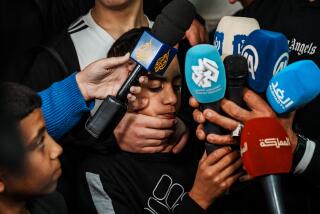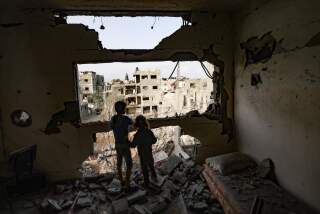Iraqi Woman Held by INS Is Freed on Bond
- Share via
TARZANA — In a spare apartment, her five children seated around her on folding chairs, Mehdia Alzubydy does not look like a threat to the security of the United States.
A black hejab, or veil, covering her hair and shoulders, the 43-year-old flung her arms around a neighbor and cried. She spoke of her children, and cried again.
Alzubydy, the wife of a prominent Iraqi dissident, was released on bond last week from the Immigration and Naturalization Service detention center in San Pedro. She was sent there nearly two months ago, on the same day that her children won the right to settle in the U.S. as political refugees.
For eight weeks, she was the only Iraqi and one of only two Arabic-speaking women in the all-female detention center. She was not allowed to wear her veil or her joba, the long, black caftan donned by some devout Muslim women in public--not even to cover her orange jail jumpsuit when she was alone with her attorney, a man.
“The most horrible part was they didn’t allow me to cover my hair, and made me wear jail clothes. The most bad feeling was at that point,” Alzubydy said Friday.
“Being innocent,” she added, “I never had any guilt.”
According to the INS, Alzubydy and 12 Iraqi men also being detained in Southern California are potential security threats. The agency declined again last week to elaborate on its reasons.
But the families of those who are being held say that it was the U.S. government that brought them here in the first place, with promises of political asylum as thanks for helping the Central Intelligence Agency in failed efforts to unseat Iraqi dictator Saddam Hussein.
Initially, the INS detained 59 of the 6,500 Iraqis who had been airlifted to safety last fall in a massive effort to save anti-Hussein activists and their families from the encroachment of the dictator’s forces. After a week in custody at the Mira Loma jail near Lancaster, most of them, including Alzubydy’s children and the wives and children of a dozen others, were released.
Alzubydy, whose husband is a top official of the Iraqi National Congress, a U.S.-backed anti-Hussein group, was loaded onto a bus bound for San Pedro. She could see her children in the bus ahead of her as they headed to freedom in Glendale, where they briefly shared a home with other Iraqi refugees before finding their own apartment in Tarzana.
At Mira Loma, INS officials questioned her for nearly a week about her activities in Iraq. They wanted to know what her job was. They did not believe that she was not interested in politics, that to her the anti-Hussein cause was little more than an annoying adjunct to being the wife of a man who was passionate in his beliefs.
“I said I never worked, I never went to school,” the Baghdad native said. “I was a housewife. Nothing more. Nothing less.”
Her 20-year-old son, Haider, begged the officials to keep him in jail in exchange for his mother. His mother, he told them, had never been separated from her children.
The INS has said that it intends to present classified information about Alzubydy and the others at a hearing tentatively scheduled for July 2 in U.S. Immigration Court.
Hearings on the case have been closed to the public. Currently, an immigration judge is taking testimony on whether the INS can deport the Iraqis based on the technicality that none of them had visas when they entered this country--even though they were airlifted here by the U.S.
Alzubydy’s attorney, Niels Frenzen of the nonprofit firm Public Counsel, said he expects the judge to have no choice but to rule against his client and order her deported. He acknowledged that she, like the other detainees, did not have a visa. He said he expects to file an appeal as soon as the judge rules, arguing that Alzubydy does not pose a security threat.
Deportation to Iraq, he said, would mean certain death because of the political activities of her husband, who remains in northern Iraq.
Frenzen worked for several weeks to secure Alzubydy’s release on bond, successfully arguing that her psychological condition was deteriorating because of her separation from her children and her relative isolation in jail. The other Iraqis awaiting word of their fate, all men, are being held together either at Mira Loma or the Lerdo jail near Bakersfield.
To her family, it was a grueling lesson in the workings of American bureaucracy. After a judge granted her temporary release last week, money had to be raised for her bond. It was puny by American standards--just $3,000--but a fortune for a family that recently resettled, scraping by mostly on donations.
Alzubydy’s son-in-law, Allah Alzubydy, has found work as a craftsman. He is married to her eldest daughter, 22-year-old Najlaa. Her other children--daughter Aber, 21, and sons Haider, Ali, 18, and Hussein, 14--are in the process of enrolling in school or English classes.
At last, the Iraqi National Congress came up with the bond money, which was wired late Wednesday to Los Angeles from the organization’s office in London.
When the money arrived the next morning, Frenzen rushed to pay the bond--only to learn that the INS did not accept payments of this type on Thursdays.
A phone call to a supervisor led to permission to pay later in the day. But by then there was another snag: Because of the delay, the bus that would carry Alzubydy’s release papers to San Pedro had already left.
Another would not leave until some time between 6 p.m. and midnight--INS officials wouldn’t say exactly when. And Alzubydy could not be released until the papers arrived.
Shortly before 7 p.m. Thursday, Frenzen drove to Tarzana from his West Los Angeles office to pick up Najlaa and Allah, who had traveled by bus from Dallas to help out.
They arrived at the INS detention facility in San Pedro around 8. Forbidden to enter, they settled down to wait in the chilly evening air.
The rest of the family stayed behind in Tarzana. Aber prepared a modest feast. She cooked rice and beans and chicken and set out cups of apple juice. She made hot tea and put apples, oranges and bananas in a big bowl.
Then she and her brothers went out in front of the apartment building. As cars whizzed by on Reseda Boulevard and the evening turned to night, they, too, waited for their mother.
Back at the detention center, a little after 9 p.m., a voice came over the loudspeaker.
“Mehdia Alzubydy,” it called. They were ready for her.
Led out by a guard, Alzubydy stopped first in a small room to change her clothes. She put on her joba, covering herself from head to toe in the protective black garment.
She wrapped her hejab--black with black lace flowers at its long ends--around her head and neck.
At 10:15 p.m., an officer escorted her outside.
“I saw my daughter and Allah and the lawyer,” Alzubydy recalled the next day. She wept softly.
“The first thing I thought was to hold them in my arms and to kiss them,” she said. “And then I thought, ‘This will never happen again.’ ”
More to Read
Sign up for Essential California
The most important California stories and recommendations in your inbox every morning.
You may occasionally receive promotional content from the Los Angeles Times.










